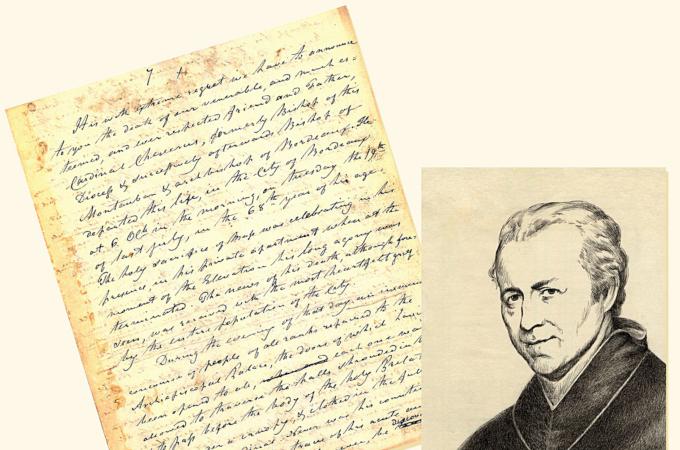On the death of Cardinal Cheverus, 180 years ago
This month marks 180 years since the death of Cardinal Jean Cheverus, the first Bishop of Boston. The papers of his successor, Bishop Benedict Joseph Fenwick, contain a draft of Fenwick's announcement sharing this tragic news with the people of Boston.
Jean Louis Anne Madeleine Lefebvre de Cheverus was born in Mayenne, France, on January 8, 1768. He was ordained in Paris, and after being imprisoned during the French Revolution, fled to England. After several years in England, he received an invitation from Father Francis A. Matignon, inviting him to come to Boston. Cheverus accepted, and arrived on October 3, 1796.
Upon his arrival, Cheverus travelled throughout New England, celebrating Mass with Native Americans and distant settlers who had been imploring Father Matignon to send a priest to them. In the city of Boston itself, he helped build a positive relationship between the Catholic and non-Catholic communities, particularly during the yellow fever epidemic of 1798. He also helped establish the Church of the Holy Cross, a predecessor of the Cathedral of the Holy Cross, which was completed in 1803.
When the Archdiocese of Boston was established by Pope Pius VII, in 1808, Cheverus was appointed bishop. He continued to work alongside Father Matignon until his death in 1818, laying the foundation from which the Catholic community of Boston would continue to grow.
In 1823, Cheverus relinquished his role as Bishop of Boston so he could return to his native France, departing in September of that year. Cheverus would spend his remaining years in France, being named Bishop of Montauban in 1824, and then Bishop of Bordeaux in 1826. He was elevated to Cardinal ten years later, but passed away shortly thereafter on July 19, 1836, in Bordeaux, at the age of 68.
In his statement, Bishop Fenwick reveals the circumstances of his death: "The holy sacrifice of Mass was celebrating in his presence, in his private apartment, when at the moment of the elevation his long agony was terminated. The news of his death, although foreseen, was received with the most heartfelt grief by the entire population of the city."
The following paragraph describes how his residence was surrounded by people from all classes of society, who formed a procession to enter into the building, now shrouded in black, to view his body one more time. Fenwick continues that "although his eyes and lips were closed, they thought they could still discover in his features that expression of his kindness so habitual to him and which had gained him the hearts of all."
What his personal papers, and those of his contemporaries such as Fenwick, reveal, is a selfless priest who performed his duties with humility, sincerity, and an uncommon devotion to his work. From the sentiments conveyed in Fenwick's message, and the scenes he describes, it is evident that he had a great effect on all of those whom he served.
One anecdote which is worth noting, and shared by Fenwick in this document, is from the final days of Cheverus' life. After being elevated to Cardinal, he would joke with visitors saying "Ah! My friend, pray that this scarlet robe may not burn me. I was far more happy before I was clothed with it, and I ought to fear that God may say to me: 'though hast already received thy reward while on earth."
Bishop Fenwick closes the announcement by providing details for a series of Masses in memory of Cardinal Cheverus.
For more about Cardinal Cheverus, please see: Jean Lefebvre de Cheverus, 1768-1836, by Annabelle M. Melville. The Bruce Publishing Company, Milwaukee, 1958.
Thomas Lester is the archivist of the Archdiocese of Boston.



















